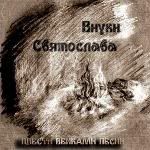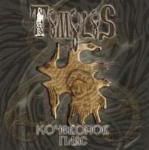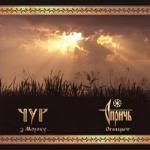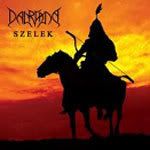
Artist: Твердь (Tverd) [Russia]
Album Title: Вслед за Солнцеворотом (Follow the Sun's Way)
Record Label: CD-Maximum (Russia)
Released: 2008 (October)
2008 saw many well-regarded pagan metal releases from bands on international metal labels, such as Arkona's Ot Serdtsa K Nebu (re-release), Equilibrium's Sagas, Týr's Land, and Eluveitie's Slania. An album that easily ranks among these, but is probably destined to be overlooked, is the excellent debut album by Russia's Tverd (or, more properly romanized, Tverd'). Unfortunately, like Alkonost or Butterfly Temple, Tverd doesn't have international distribution, but they deserve to.
Tverd is the band that Pagan Reign guitarist/traditional instrument-player Vetrodar began after that band broke up in mid-2007. Pagan Reign was a great band that seemed to be heading in an awesome direction with their final album, 2006's Tverd' (aka Ancient Fortress), with its inclusion of many traditional folk instruments, and many of us were grief-stricken when we found out they were no longer together. A planned acoustic album, apparently only featuring founding member Orey, never appeared. But then, suddenly, this new band Tverd appeared, and, due to the amount of Pagan Reign songwriting that had been done by Vetrodar, Tverd sounds rather similar to the final Pagan Reign album, except with different vocals. In fact, according to the insert notes (thankfully included in English), Tverd is meant to be a natural progression of Pagan Reign. Excellent!
Now, how about the actual album? Well, as I mentioned, the major departure from Pagan Reign is in the vocal department. Tverd has three vocalists. The harsh vocals are handled by Vetrodar, but they are not featured very prominently. Instead, many of the vocals are done in an operatic style (by Alexandr Ivanov) and folk style (by Svetlana Lebedeva). Some don't like the operatic vocals of Alexandr Ivanov, but I think they have a tendency to grow on a person. He has a great voice and range, and I think his vocal style fits the style of music. Svetlana Lebedeva is stated in the insert to do folk and academic opera style vocals, but I don't really hear the opera style. She does great folk-style vocals, though, and handles the lead vocals on Масленица Широкая ("Wide Maslenitsa") and the traditional На Чужую Сторонушку ("To the Foreign Land"). In other songs, she harmonizes beautifully with Alexandr.
Vetrodar plays guitar and a wide array of traditional instruments, including various flute and reed instruments, bagpipes, zhaleyka, balalaika, domra, and mandolin. There are several sections where you'll only hear the traditional instruments (along with acoustic guitar), including on the two instrumental pieces, but for the most part the traditional instruments are omnipresent, and they mix well with the metal elements. The songwriting on Follow the Sun's Way is top-notch all-around, and everything is well-played. The rest of the band is guitarist and gusli-player Ratibor, bassist Sigurd, and drummer Demosthen (another former Pagan Reign member). The lyrics are fairly typical of Russian pagan metal bands (battles, traditions, pro-Russian themes, nature, Slavic gods, etc.).
Follow the Sun's Way is a pretty heavy album, with crunchy guitar riffs, the occasional guitar solo, and some great and varied drumming, but it's made more accessible by the clean vocals and the presence of traditional instruments. Some people avoided Pagan Reign because of Orey's vocals (which I greatly enjoyed), but Tverd should give them no such excuses. Follow the Sun's Way is a pretty unique album and will probably not appeal to everyone, but in my opinion it's definitely one of the best you'll hear this year, if you can find it.
There are many highlights on this album, but the centerpiece is Богатырская Застава ("The Bogatyr’s Gates"), which is described as an "epic metal cantata." While I wouldn't go so far as to call it a cantata, this eight-and-a-half minute song is certainly epic. Alexandr Ivanov gives his best performance on this song, which tests the high end of his range (which, thankfully, never approaches Rob Halford territory; Ivanov is an operatic tenor). The songwriting on this piece is complex, and has a quality of Russian classical music. There's a beautiful acoustic part near the end, with some great vocal harmonizing, which continues as the song turns to metal again for a brief time until its abrupt ending.
The final song on the album, the instrumental (with the exception of Svetlana's wordless vocals) Печаль Земли Русской (Калинов Мост) ["Russian Land’s Sorrow (Kalinov’s Bridge)"], is the only one that breaks the pleasant folk metal mold that the rest of the album falls into. It does this rather harshly towards the end with the addition (or, in my opinion, intrusion) of heavy electronic elements. The first five minutes are beautiful, reminding me of the final, instrumental, song on Pagan Reign's Tverd', but then it unexpectedly turns into something akin to a track from Aphex Twin's Drukqs, and not one of the beautiful piano or ambient pieces. This jarring and annoying ending is the only negative I can find on Follow the Sun's Way, and I'm sure there was a reason for its inclusion, but I would have rather they not bothered with it.
Overall, this debut album from Tverd is an awesome release, and, at a little over an hour, it's a good length. It's ambitious to combine the operatic elements with folk and metal, but Tverd does a great job, and in the process have created one of the essential pagan metal albums of 2008. Highly recommended.

















